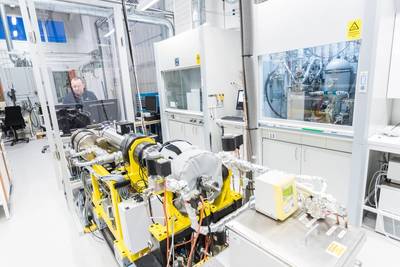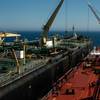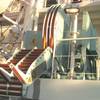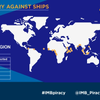Wärtsilä Testing Ammonia as a Marine Fuel
As marine operators and euipment manufacturers continue to explore alternative marine fuels as a means to help lower vessel emissions, technology group Wärtsilä said it has initiated combustion trials using ammonia.
As part of the tests, ammonia was injected into a combustion research unit to better understand its properties. Based on initial results, the tests will be continued on both dual-fuel and spark-ignited gas engines. These will be followed by field tests in collaboration with ship owners from 2022, and potentially also with energy customers in the future, Wärtsilä said.
“The first tests have yielded promising results and we will continue to optimize combustion parameters,” said Kaj Portin, General Manager, Fuel & Operational Flexibility, Wärtsilä Marine. “This is an important step in making sure that Wärtsilä can provide the engine and fuel systems that ship owners need, whichever fuel they choose in the future.”
Ammonia is a promising, carbon-free fuel as shipping explores how to fulfill the International Maritime Organization’s vision of reducing greenhouse gas emissions from shipping by at least 50% by 2050, while the energy sector is developing optimal paths for 100% renewable energy systems already today. Although ammonia is derived mainly from fossil sources today, in the future ammonia’s greenhouse gas footprint can be nearly eliminated if it is produced using electricity from renewable sources.
Several other industry players have been exploring ammonia's potential as well.
ABS is working with MAN Energy Solutions and the Shanghai Merchant Ship Design & Research Institute (SDARI) to develop an ammonia-fueled feeder vessel.
In another project involving MAN, Lloyd’s Register (LR) has granted Approval in Principle to Dalian Shipbuilding Industry Co. (DSIC) and the engine manufacturer for an ammonia-fuelled 23,000 TEU Ultra-Large Container Ship (ULCS) concept design.
LR and MAN are also working with MISC Berhad and Samsung Heavy Industries (SHI) an ammoniea fueld tanker.
For Wärtsilä, the recent tests are just the latest step as the company aims to develop a complete ammonia fuel solution comprising engines, fuel supply and storage. Wärtsilä said it is working with ship owners, shipbuilders, classification societies and fuel suppliers to learn more about system and safety requirements, as well as fuel composition, emissions and efficiency.
In January, Norwegian oil company Equinor signed a deal with vessel owner Eidesvik Offshore to test the fuel aboard the Viking Energy platform supply vessel. Wärtsilä is developing ammonia storage and supply systems as part of the project.
The company noted it has also gained significant experience with ammonia from designing cargo handling systems for liquid petroleum gas carriers, many of which are used to transport ammonia.
Ammonia has a number of properties that require further investigation. It ignites and burns poorly compared to other fuels and is toxic and corrosive, making safe handling and storage important. Burning ammonia could also lead to higher NOx emissions unless controlled either by aftertreatment or by optimizing the combustion process. A regulatory framework and class rules will need to be developed for its use as a marine fuel.
Wärtsilä is also investigating several other future fuels, including synthetic methane, hydrogen and methanol, with a view to providing complete flexibility across engines and the fuel chain. Internal combustion engines can be adapted to burn any fuel. Dual-fuel or spark-ignited engines are already capable of burning liquefied natural gas (LNG) - from fossil, biomass or synthetic sources – while diesel engines can run on liquid biofuels, biodiesel or e-diesel.
Wärtsilä has extensive experience in converting engines to other fuels, including diesel to dual-fuel, as well as engines capable of burning methanol and volatile organic compounds from crude oil cargoes. The modularity of modern engines means that conversions can be made with a very limited exchange of components. Wärtsilä’s investment in modular engines and in storage and supply systems will enable shipping’s transition from current fossil fuels to bio- and synthetic fuels.














